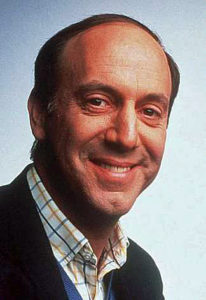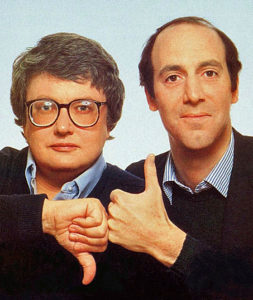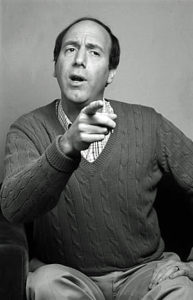Published in The Kansan City Kansan Feb. 26, 1999, my weekly column focused on the Feb. 20 death of film critic Gene Siskel.
 By Steve Crum
By Steve Crum
Gene Siskel’s death last week at 53 disturbed me more than I expected. The man was neither a superstar nor a childhood idol—I am only a couple of years his junior. I make the latter reference because of the personal effect of last year’s passings of Buffalo Bob Smith, Roy Rogers, and Gene Autry.
Yet moments after hearing of this movie critic’s death I was stunned. That reaction surprised me until I thought about it. First there were the dozen calls from friends and relatives telling me about how shocked they were. Never in any previous phone conversation had Siskel ever even been mentioned. Yet now he was newsworthy, and spoken of as if it were a distant relative who had died. Then I thought about it some more.
Undoubtedly the calls I received were in part prompted by the fact that I am also a film critic—a media kinship link, perhaps. But that was not the all of it. My callers felt as I did: Gene Siskel, even more than his TV partner Robert Ebert, talked about movies in ways we could all understand. And most of the time. we agreed with him over Ebert. Most of us enjoy movies, and many of us savor them.
Siskel’s joy and passion was evident in each and every broadcast and column, and viewers and readers loved him for it. That does not mean that we always agreed with him. And that does not mean he was the first movie critic ever. But Siskel could be called the first people’s film critic. He was always interesting, incisive, sensitive—be the movie a Mel Brooks farce, a fanciful George Lucas space adventure or a serious Schindler’s List. Conversely, like any critic, when a movie was turkey, he was quick to take the first carving.
 He and his colleague Ebert and franchised the art of movie opinions into a vastly popular TV series that ran in similar forms for 24 years. Their chemistry clicked, and now we know that a friendship and brotherly love developed. Sometimes, especially in the early days, their critical barbs often lashed at each other in addition to the targeted films. In recent years, though, that softened to good natured, highly opinionated discussions.
He and his colleague Ebert and franchised the art of movie opinions into a vastly popular TV series that ran in similar forms for 24 years. Their chemistry clicked, and now we know that a friendship and brotherly love developed. Sometimes, especially in the early days, their critical barbs often lashed at each other in addition to the targeted films. In recent years, though, that softened to good natured, highly opinionated discussions.
The last time I watched Siskel & Ebert, three weeks ago, Roger Ebert was soloing. Siskel was absent, having already announced that he was taking some time off to recuperate from brain surgery. Ebert ended the broadcast with: “And Gene, I want you to know that it is awfully lonely up here in the balcony without you. Get better soon.”
Sadly, that was not to be, and Gene Siskel soon passed. Now Roger Ebert’s future as a TV critic is unknown. For a time he will experiment with alternating guest co-hosts, probably hoping that a similar Siskel and Ebert spark will occur. We all know that like any original, no substitute will ever be like Gene Siskel. No one has to reveal that fact to Roger Ebert.
 Even in his final days, post surgery, Siskel’s vision and fervor for the motion picture is evident in a Chicago Tribune column he wrote on Dec. 20, 1998. In it, he speaks of the year in films that had ended, and lauds the future years. An excerpt:
Even in his final days, post surgery, Siskel’s vision and fervor for the motion picture is evident in a Chicago Tribune column he wrote on Dec. 20, 1998. In it, he speaks of the year in films that had ended, and lauds the future years. An excerpt:
“1998 was a magnificent year for movies, the best of the decade, perhaps the best of two decades, fueled largely by advanced use of computer-generated images, which at the conclusion of the first century of filmmaking now must considered a major force akin to someone discovering the use of actors to tell a story.
“Indeed as we move toward a cinematic centenary, what we shall see is truly, more than ever, limited only the imagination of a filmmaker. Most limits are off now.”
If only Gene Siskel could have lived to experience that future, and we could hear about it through him.
